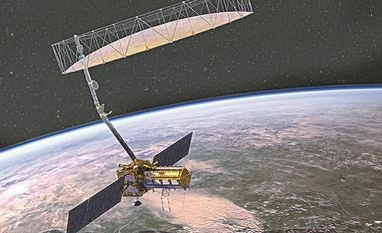Mumbai-based start-up plans to set up fuel stations in outer space
Orbit Fab, a US-based company, has also unveiled plans to launch re-fuelling services for satellites and aims to set up fuel depots in low earth and geostationary orbits
)
Manastu Space has orders from Defence Research and Development Organisation for the propulsion systems for its satellites.
Scientists at a Mumbai-based start-up are working on technologies to offer efficient propulsion systems and re-fuelling satellites in outer space to extend their lifespan.
Manastu Space, a five-year-old start-up launched by two IIT-Bombay alumni Tushar Jadhav and Ashtesh Kumar, has come up with a propulsion system for satellites that utilises affordable, green fuel as opposed to the conventional propellant, which is carcinogenic.
The current fuel hydrazine is toxic and carcinogenic. We have developed a propellant using hydrogen peroxide, which is easily available and put some proprietary additives to improve its performance, Jadhav, the chief executive officer of Manastu Space, told PTI.
Our fuel is as safe as common salt in terms of toxicity and 50 per cent more efficient, he said, adding, the propulsion systems developed by the firm were 20 per cent more agile than those currently in use.
Satellites use on-board thrusters to stay in orbit, dodge space debris and subsequently move to the graveyard orbit, also referred to as a junk orbit or disposal orbit, once their lifespan is over.
Also Read
Compared to some electric propulsion systems, we are more agile. We generate more thrust. It is like comparing a moped with a Mercedes. We can quickly change direction and gain speed to avoid space debris, Jadhav said.
He said the start-up also has plans to set up fuel stations in space to offer re-fuelling of satellites in outer space.
Life of a satellite is over when the fuel is over. What we are proposing is that you can get re-fueling as an option. Just as we do not abandon our car when the fuel gets over, re-fuelling satellites is now becoming possible, he said.
Orbit Fab, a US-based company, has also unveiled plans to launch re-fuelling services for satellites and aims to set up fuel depots in low earth and geostationary orbits.
According to Ashtesh Kumar, chief technology officer and co-founder of Manastu, said the next decade is expected to witness the launch of 57,000 satellites and the satellite propulsion market is pegged at 20 billion dollars. Manastu plans to test its satellite propulsion system in a simulated environment by September, he said.
Our goal is to test this technology in outer space by March 2023 and start commercialising soon after, Kumar said.
Manastu Space has orders from Defence Research and Development Organisation for the propulsion systems for its satellites and has inked a Memorandum of Understanding with a French launch vehicle company.
(Only the headline and picture of this report may have been reworked by the Business Standard staff; the rest of the content is auto-generated from a syndicated feed.)
More From This Section
Topics : Start-ups Mumbai Satellites
Don't miss the most important news and views of the day. Get them on our Telegram channel
First Published: Apr 24 2022 | 4:45 PM IST


